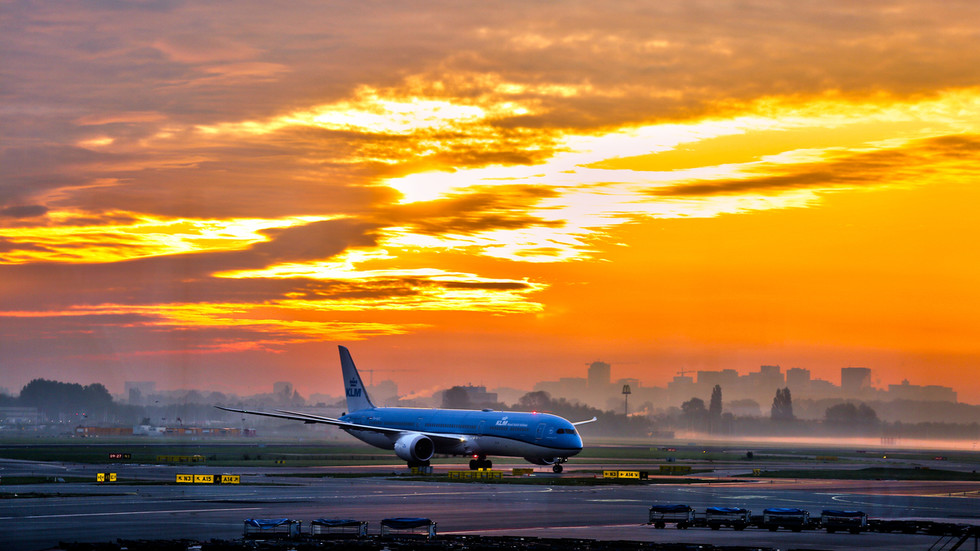Remnants of military conflict surround Zhang Zhong Jie's cafe.
The coffee shop sits within an abandoned military fortification, its entrance surrounded by rusting tanks.
It's a scene the citizens of Taiwan's remote Kinmen Island know well. All that separates the cafe from mainland China are 6 miles of choppy water and a row of anti-invasion spikes along the beach.
Despite the long-standing tensions between Taiwan and China, tourists from the mainland were the cafe's main source of revenue since it opened in 2018.
"In the beginning, we had regular group tourists — perhaps at least two or three busloads from travel agencies every day," Zhang said.
But five years on, things look very different.
A row of anti-invasion spikes line a beach on Kinmen, with the Chinese mainland in the distance.
Source: Jan Camenzind Broomby
Although China claims sovereignty over Taiwan, Chinese tourists were prevented from visiting Taiwan for years.
In August 2019, Beijing blocked individual travelers from visiting Taiwan, citing poor cross-strait relations. In 2020, tour groups were banned from visiting because of Covid-19 pandemic.
For many on Kinmen, the lack of Chinese visitors has been devastating.
"We haven't had mainland tourists for years," Zhang said. "The tourism industry in Kinmen has long been heavily reliant on Chinese tourists, so the impact is definitely significant."
From tanks to tourism
In the mid-20th century, Kinmen was on the front line of China's conflict with Taiwan.
Soldiers trained on its beaches, towns were filled with anti-Communist propaganda, and bomb shelters were tucked away in gardens.
Unopened shops line the streets of Kinmen.
Source: Jan Camenzind Broomby
But as the military presence in Kinmen subsided, the island pivoted toward tourism.
Residents didn't shy from the island's conflict-ridden past. Like Zhang, many opened cafes in former military fortifications, sold "war rations" in restaurants or made specialty "bomb knives" out of old Chinese artillery shells.
A short boat ride away
Kinmen is roughly 1.8 miles from China, according to the Kinmen County Government — but more than 110 miles from the Taiwanese mainland.
As a result, "business in Kinmen generally depends heavily on… links with mainland China," said local tour guide Chen Hua Sheng. Half-hour-long boat rides that connect the island with China are running again, but have been mostly filled with Taiwanese passengers since Chinese travelers weren't allowed to visit Kinmen.
With the end of Covid, many hoped those boats would ferry Chinese visitors back to Kinmen once more.
But on Feb. 14, two Chinese citizens were killed during a collision between a Taiwanese Coast Guard boat and a Chinese boat, sparking an escalation of tensions.
Chinese tourists are now traveling to some of Taiwan's remote islands, but the return of travelers to Kinmen has been slow. Figures from Taiwan's Mainland Affairs Council show that the number of Chinese nationals entering Kinmen by boat dropped from more than 400,000 in 2019 to fewer than 18,000 in 2023.
For Wu Zeng Yun, CEO of the governmental Kinmen-Matsu Joint Services Center, the lack of tourists has been interpreted as a punishment from Beijing, he said.
Struggling under pressure
With [cut?] local business owners have felt the impact of the loss of Chinese tourists, who previously contributed nearly $200 million to Kinmen's annual economy.
Noodle shop owner Beddy Chang said Chinese visitors once comprised 80% of her customer base. Without them, she's now turned to exporting products abroad, she said.
Others like Wu Zeng Yun — whose family once made and sold Kinmen's "bomb knives" to tourists — have shifted their businesses toward Taiwan's main island.
"Without mainland tourists, we take our business out," Wu explained. "We regularly hold events in department stores across Taiwan."
But others have had less luck.
After former restaurant owner Lu Wen Shiung closed his business, he began fishing and offering boat tours to supplement his income. But this too has been difficult, he said.
Lu Wen Shiung turned to fishing and boat tours after closing his restaurant on Kinmen.
Source: Jan Camenzind Broomby
After the Feb. 14. incident, China's Coast Guard significantly increased its presence in the area, crossing into Kinmen's restricted waters on numerous occasions, staging military exercises in May and even boarding a Taiwanese tour boat in February.
Standing in his small boat in the narrow strait that separates Kinmen and China, Lu said he experienced those escalations firsthand.
He showed videos he filmed on his phone of Chinese Coast Guard ships bearing down on him as he motored through the waters around Kinmen.
"There is a slight concern that if we are taken while in our waters, we might be subjected to some unconventional treatment," Lu said, staring out across the waves.
Sustained hope
In late July, Taiwanese and Chinese authorities reached an agreement over the Feb. 14 boat incident that allowed the bodies of the dead Chinese fishermen to return to the mainland.
At the end of August, local Kinmen legislator Chen Yu Jen travelled to Beijing to discuss the resumption of tourism to Kinmen. She was told that Chinese tourists would soon return.
A military outpost on Kinmen island, Taiwan.
Source: Jan Camenzind Broomby
The first group of mainland tourists arrived in Kinmen in late September, according to local media.
The 22 people who arrived for a two-day visit don't represent a full-scale return of Chinese tourism, but it is a start. However, some in Kinmen expressed skepticism that the situation would ever return to what it once was.
But local guide Chen is optimistic, he said.
"We hope mainland Chinese people can visit Taiwan and Kinmen again to promote economic development on both sides."
— Translators Alex Huang and Edison Tseng contributed to this report.

 By CNBC (World News) | Created at 2024-10-07 23:15:32 | Updated at 2024-10-08 02:35:48
3 hours ago
By CNBC (World News) | Created at 2024-10-07 23:15:32 | Updated at 2024-10-08 02:35:48
3 hours ago



